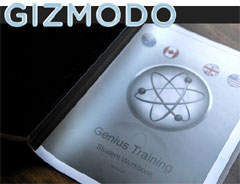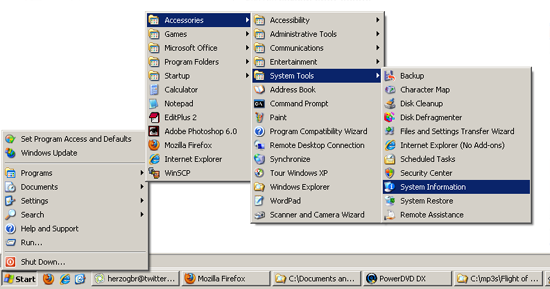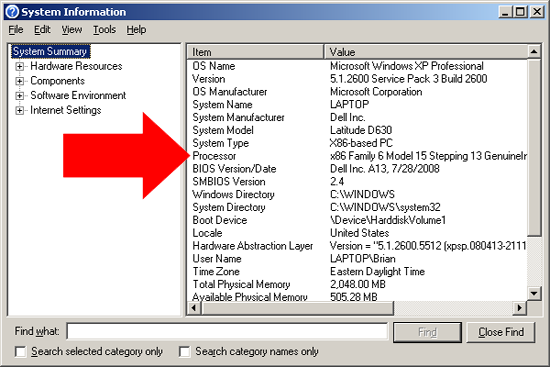August 29th, 2012 Brian Herzog
A couple of totally unrelated really good ideas (I think), before I head to Ohio for a long Labor Day weekend:
Good Idea #1
First, for all you DVD collection development librarians out there, here is a must-add for the library's collection:
A 50-DVD set of The Red Green Show! 300 episodes = ~124 hours of wisdom from Possum Lodge, plus bonus material. Of course, the $299.99 price tag made my colleague who does our DVD selection just say "no."
Good Idea #2
 Second, an Apple Store training manual for their Genius Bar employees was reviewed at Gizmodo. From the tl;dr write up on BoingBoing, some great training gems caught my eye:
Second, an Apple Store training manual for their Genius Bar employees was reviewed at Gizmodo. From the tl;dr write up on BoingBoing, some great training gems caught my eye:
What does a Genius do? Educates. How? "Gracefully." He also "Takes Ownership" "Empathetically," "Recommends" "Persuasively," and "Gets to 'Yes'" "Respectfully."
From the comments, it appears the existence of this manual met with a large degree of cynicism. However, swap out "Genius" for "Librarian" and this exactly sums up what our desk staff should aspire to.
Taking ownership of a problem can be difficult in a public library, because not everything is something library staff can help with. But when it is within our power - especially concerning a library resource or service - taking ownership is the best way solve a patron's problem. Because if one of our patrons can't use a library resource, then it's a library problem.
And initially I was uncomfortable with the word "persuasively," because it sounds very retail. But after I thought about it, I often actively try to persuade patrons all the time, in the sense of recommending - and leading them to - what I think is the best resource. "Yes, maybe this recently-published book on skin cancer is a better choice, even though that one from 1995 is thinner and has more pictures. Of course, you can always take both." Or, "Instead of trying to figure out how to cite Yahoo Answers in your term paper, how about I show you how to use our journal databases?" Of course librarians persuade - empathetically and respectfully - but don't force or withhold information. We certainly try to recommend the best resources possible, but it's always up to the patron to make their own decisions.
Not that I should be surprised Apple has good customer service ideas - I've certainly drawn inspiration from them before.
I hope everyone has a good long weekend - see you next week.
Tags: apple, apple store, collection development, customer service, dvd, genius bar, good ideas, libraries, Library, public, Random, red green, Service, the red green show, training
Posted under Uncategorized | 1 Comment »
July 23rd, 2011 Brian Herzog
 This questions wasn't at all difficult, but I thought it was interesting because it was something I thought I knew how to do, but it turns out I didn't.
This questions wasn't at all difficult, but I thought it was interesting because it was something I thought I knew how to do, but it turns out I didn't.
A patron walks up to the desks and says,
I have some software at home I want to install on my computer. However, there are two install disks - one for computers with a 32 bit processor and one for computers with a 64 bit processor. How do I tell what processor my computer has?
The patron had an XP computer, which is also what I was on at the desk, so that made things easier.
My first instinct was to go to Device Manager, so we did, but no matter where we looked, nothing I could find gave the processor speed. I sure there are multiple ways to find this out, but in the interest of time I searched the internet for is my processor 64 bit or 32 bit xp. The first result was titled What operating system Do I have? A 32bit or a 64bit? | Computer Tips - perfect.
The site itself looked a little suspect, but as we read the page together, the information seemed okay. It gave instructions for both XP and Vista - and the XP instructions guided us to somewhere I never would have even thought of:
Start > Programs > Accessories > System Tools > System Information
When that window opens, look for the Processor line:
Here's how the site says to read it:
If it says x86 then you have a 32 bit operating system. If the processor area mentioned ia64 or AMD64 then this means you have a 64 bit processor. If it said Microsoft Windows XP Professional x64 Edition Version then this means it is a 64 bit operating system. However as you can see from above, it says Microsoft Windows XP Professional and the processor starts with X86 so therefore this is a 32 bit processor with a 32 bit operating system.
This answered the patron's question, and since we both learned something, it was a good exchange. The funny part (to me) is that the patron said he was right in the middle of installing the software, and came to the library because it was the only place he could think of that would give him free computer information. He was happy I found the answer so quickly and he apologized for rushing out.
Free is questionable, but quite timely on people thinking of the library as genius bar - all the more reason reference staff need to also provide some degree of technical support.
Posted under Uncategorized | 4 Comments »
 Second, an Apple Store training manual for their Genius Bar employees was reviewed at Gizmodo. From the tl;dr write up on BoingBoing, some great training gems caught my eye:
Second, an Apple Store training manual for their Genius Bar employees was reviewed at Gizmodo. From the tl;dr write up on BoingBoing, some great training gems caught my eye:



